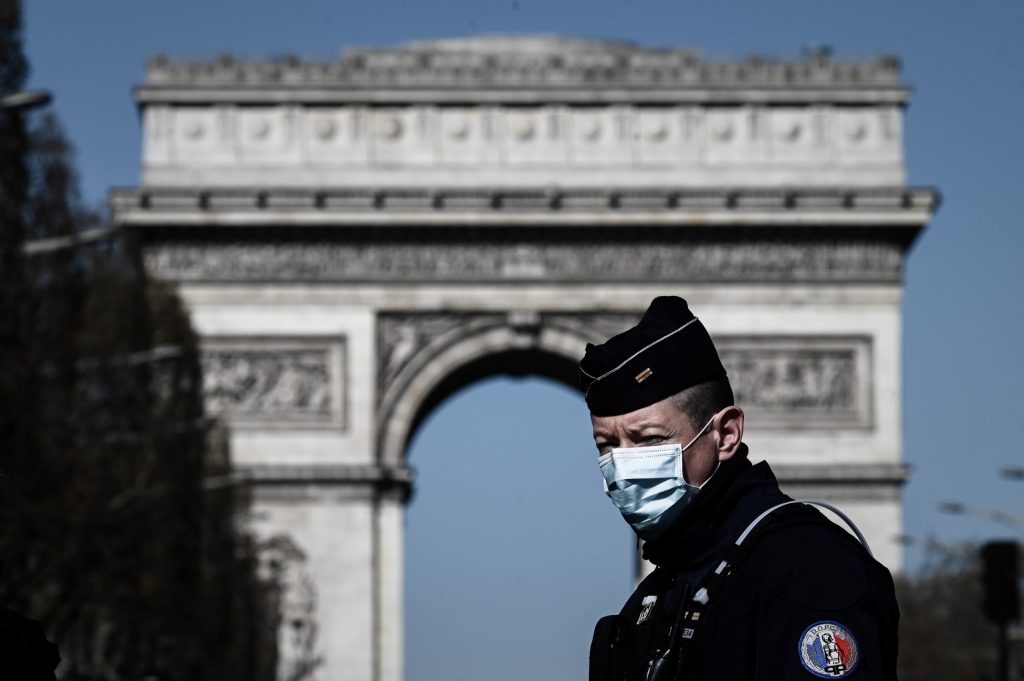In France there is a palpable sense of administrative and political panic in how to deal with the coronavirus epidemic. As I write from Perpignan on the French-Spanish border on the morning of March 24, France has 19,856 coronavirus cases, 860 deaths and 2,082 critically ill; Britain 6,650, 335, 20. After Italy and Spain, France is the third worst affected country in Europe (Germany has more cases because it tests more, but only 123 deaths), but it has imposed and enforced the most severe lockdown.
France went into lockdown on March 17. The administrative state immediately generated an array of bureaucratic forms: a certificate to leave your house to walk the dog or go shopping; a certificate justifying your attendance at work rather than working from home. These certificates are to be carried on your person at all times and produced on demand by the authorities. As of this morning ‘confinement’ is being notched up again. Village and municipal food markets are to shut; leaving your house for shopping or exercise is limited to one hour and can take place no more than one kilometer from your home. The time of departure from your house is to be indicated on a certificate. Any infringement is to be punished by a minimum fine of €135 ($145), which rises to €1,500 ($1,615) for repeat offenders.
Five days into lockdown on March 21, French interior minister Christophe Castaner — whose brutal repression of the gilets jaunes is legendary — boasted on Twitter about the achievements of his 100,000 police tasked specifically with enforcing ‘confinement’: 867,695 individuals checked by the police, 38,994 fines issued. He didn’t detail the hundreds arrested for the French crime of ‘endangerment’ — putting other people’s lives in danger — punishable by six years’ imprisonment.
This is only the beginning. Confinement was scheduled to last 15 days. It is an open secret that it will be renewed, perhaps even until the first week of May when the education minister has said schools could go back. French ‘confinement’ is now approaching house arrest for its 67 million citizens. A rapidly growing number of mayors, in areas such as Nice, Montpellier, Arras, Béziers and Perpignan are going further and have invoked powers allowing them to impose curfews on their populations from 8 p.m. to 6 a.m.
Even this is not enough. On Sunday the doctors’ trade union applied to France’s highest administrative court, the Conseil d’Etat, to force the prime minister and the government to impose harsher confinement across France on the grounds that their ‘laxism’ was life-threatening. The judgment went in the doctors’ favor and gave the executive 48 hours to harshen conditions, which they have done.
This is France, the home of the Rights of Man and the Citizen, regressing to that of Robespierre and the Great Terror. France hesitated greatly before going down the repressive route. But once they had adopted it, the administration became prisoners of their own logic. Because many French people were not respecting the measures, equality of treatment – that great theoretical French totem – demanded even greater repression. And so the spiral continues.
But the governing class is uncomfortable. They appear to have believed other states would follow their lead on rigid confinement. They are sensitive to the fact that only six out of some 30 European states (France, Italy, Spain, Belgium, Luxembourg, Austria) are enforcing confinement so strictly, and they clearly would have liked one of the larger democracies to join the club. This is why President Macron pressured Boris Johnson the day before yesterday to apply tougher confinement rules, and threatened to close the border with Britain if he failed to do so. (The border is effectively closed anyway given the stringent restrictions on all individuals’ movements in France).
There is also simmering panic because the French government is increasingly aware that in parts of France confinement is being deliberately flouted as a gesture of protest against the French state. This is the case, for example, in the northern banlieues of Paris. They have long been taboo, swept under the carpet by politicians and media alike. Applying the curfews and confinement with the same stringency as elsewhere has the potential to spark serious rioting, violent clashes with the police and the stigma of French race riots. On March 20 the French government’s official spokesman floundered when attempting to explain why French police were having difficulty enforcing confinement in these areas. France’s interior minister studiously avoids the issue on Twitter.
Today is the end of week one. Pre-confinement feels like months ago. What will become of France if she is to endure another month of this? As I check the COVID-19 statistics, it is impossible not to notice those of the World Health Organization for the winter of 2018-19 when French deaths from seasonal flu reached 8,100. I was in France then too, but don’t seem to recall the panic.
This article was originally published onThe Spectator’s UK website.


















